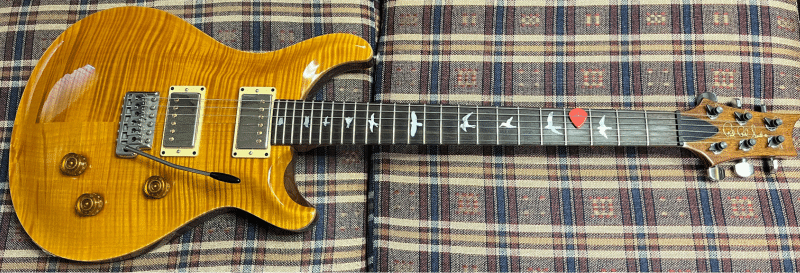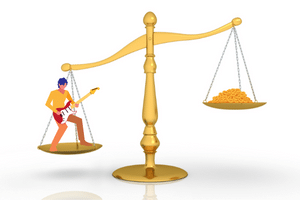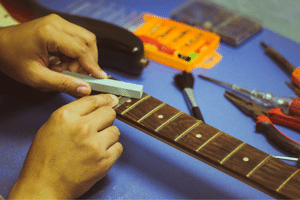Every guitarist, from the novice strumming their first chords to the seasoned professional, has pondered the question: “Is it easier to play more expensive guitars?” It’s a question that arises naturally when one considers the vast price range of guitars available on the market.
From budget-friendly options that cost less than a hundred dollars to high-end models that can cost several thousands, the price difference can be significant. In this article, I’ll reveal if shelling out more money equates to an easier playing experience.
You can use the table of contents below to take you to the area that interests you. Click on the little box to open it and then click on the section of the article you want to read, or you can read from start to finish if you want the full guitar playing journey!
The Short Answer
While expensive guitars often have superior build quality and materials, which can contribute to enhanced playability, the ease of playing a guitar is largely subjective. It also depends on the player’s skill level, personal comfort, and the guitar’s setup. A well-adjusted, inexpensive guitar can be just as easy to play as a more costly model.
Keep On Reading (Below) To Learn More
The Appeal Of Expensive Guitars
Expensive guitars often hold a certain allure for guitarists. It has always been that way with me! They are typically associated with superior quality, craftsmanship, and sound. These guitars are crafted from top-notch materials, often featuring exotic tonewoods, high-quality hardware, and meticulous attention to detail.
The build quality of expensive guitars is usually excellent. They are designed and crafted by experienced luthiers who ensure that every aspect of the guitar, from the neck joint to the fretwork, is perfect. This level of craftsmanship can contribute to a guitar’s playability.
Moreover, expensive guitars often come with a professional setup. This means that the action is adjusted, the frets are leveled, and the intonation is set, making the guitar easier to play right out of the box.
My First Expensive Guitar
I played Strats and Teles for years until I bought my first Paul Reed Smith (PRS) Custom 24 guitar back in the 1990s. You know, the one with the bird inlays on the neck, right? I was a “Ten Top” with the highest grade flame maple!
I remember what the guitar store owner said to me while I was trying it out, like it was yesterday. He said, “If you buy this PRS, you can use your Strat as a baseball bat!”
It’s true, the PRS was easier to play than most of the Stratocasters in my collection back then, but I quickly realized that part of the fun of playing a Fender guitar was in the “quirkiness” of the manufacturing process, not to mention the iconic sound!

I’ll compare it to driving an early 1950s roadster versus the giant Lincolns of the 1970s. The roadster was like the Strat, a four-gear stick shift with no power steering or power breaks, more challenging to drive, but also more fun on the road. The Lincoln, like the PRS, was all about comfort, and it virtually drove itself, but not as much fun on the twists and turns of a windy street.
So, a guitar that’s easier to play than another one isn’t necessarily as much fun and may not have the sound in it that you’re looking for.
Anyway, I didn’t sell all my Fender guitars or take my Strat outdoors to play ball with. It was a ridiculous statement, to say the least, and I still love playing them all!
Things That Make A Guitar Easy To Play
The Action
Several factors determine a guitar’s playability. One of the most critical factors is the action – the distance between the strings and the fretboard. A guitar with low action is generally easier to play because the strings are easier to press down. However, if the action is too low, it can cause fret buzz. The action on most cheap electric guitars can be adjusted low enough to play comfortably.
The Neck Profile And Fretboard Radius
The neck profile and the fretboard radius also play a significant role in a guitar’s playability. Some guitarists prefer a thin, flat neck because it’s easier to wrap their hand around. Others might prefer a chunkier neck for a fuller grip. The fretboard radius, which refers to the curvature of the fretboard, can also affect playability. A flatter radius is generally better for lead guitar playing, while a more rounded radius is often preferred for rhythm playing.
The String Gauge
The string gauge, or the thickness of the strings, can also impact playability. Lighter strings are easier to press down and bend, but they have a thinner tone and are more prone to breakage. Heavier strings require more finger pressure but deliver a fuller tone.
Finish And Materials
Things like properly shaping and removing the rough edges of the frets and rolling the sides of the neck can make a guitar easier to play. Stainless steel frets are easier to bend strings on than nickel frets.
Comparing Expensive And Cheap Guitars

It’s easy to get distracted by the beauty of a stunning finish or the sound of the pickups on an expensive guitar, but it doesn’t mean that it’s easier to play than a cheaper model. So, it’s something to keep in mind when deciding on what you really want. Bells and whistles are one thing, and playability is another.
Also, beginning players may find cheaper guitars more difficult to play than pros, but more about this later in the article.
If you’re having a problem playing a cheaper guitar but you really like its look and sound, you can ask the store manager to quickly adjust the setup to accommodate your particular needs.
I have a Made in Mexico Strat that is easier to play than a more expensive Made in the USA model, even though they both have proper setups. So, why do I keep the more expensive Strat that’s more difficult to play? It depends on who you ask. My wife would say I have guitar acquisition syndrome (GAS), but both guitars have vastly different sounds!
Key Aspects Of Guitar Playability

Here’s a table that sums up how various aspects of expensive and cheap guitars can affect their sound and playability.
| Aspect | Expensive Guitars | Cheap Guitars | Impact on Playability |
|---|---|---|---|
| Materials | Often made with high-quality woods, which can enhance tone and resonance. | Typically made with cheaper materials, such as laminated woods or lower-quality solid woods. | High-quality materials can contribute to a more comfortable and resonant playing experience. |
| Craftsmanship | High level of craftsmanship, with attention to detail in aspects like fretwork, neck joint, and finish. | Craftsmanship can vary, with some cheap guitars showing good craftsmanship, while others may have flaws like rough fret edges or poor finish. | Good craftsmanship can make a guitar easier and more comfortable to play, with smoother fret edges, a well-joined neck, and a better finish. |
| Setup | Usually come with a professional setup, making them easier to play out of the box. | May require a professional setup for optimal playability. | A well-set-up guitar is easier to play, with comfortable action, accurate intonation, and no fret buzz. |
| Hardware | High-quality hardware, such as tuners, bridge, and pickups, which can contribute to better sound and tuning stability. | Hardware is often where manufacturers cut costs, so it may be of lower quality. | High-quality hardware can improve playability by providing better tuning stability and sound. |
| Sound | Generally produce a superior sound, due to better materials and construction. | Sound can vary significantly, with some cheap guitars sounding surprisingly good, while others may be lacking. | While sound doesn’t directly affect physical playability, a good-sounding guitar can inspire the player and make playing more enjoyable. |
| Longevity | Likely to last longer and maintain their value better due to superior construction and materials. | May not last as long or hold their value as well, especially if they’re not well-maintained. | A guitar that lasts longer and stays in good condition can provide a consistently good playing experience over time. |
| Ease of Play | Often easier to play due to better setup and superior craftsmanship. | Playability can be improved with a good setup, but it may not play as smoothly as more expensive guitars out of the box. | The overall ease of play may or may not be related to the cost of the instrument. Some expensive guitars play better than cheaper ones, irregardless of the quality of the setup. |
These are general observations, and there can be exceptions. It’s always recommended to try a guitar personally before purchasing it, if possible.
How Materials Matter
Materials can enhance the ease of playability but typically to a lesser degree than a guitar’s construction and setup. Mid-level guitars are the most popular choice for players looking for playability and sound quality.
This table outlines the typical types of wood, hardware, and electrics used in beginner, mid-level, and professional guitars:
| Aspect | Beginner Guitars | Mid-Level Guitars | Professional Guitars |
|---|---|---|---|
| Body & Neck Wood | Often made with laminated woods or cheaper solid woods like basswood or poplar. Necks are often made of maple. | Typically made with a mix of solid and laminated woods. Common woods include mahogany, maple, and ash. Necks are often made of maple or mahogany. | Usually made with high-quality, solid woods like mahogany, maple, ash, alder, or even exotic woods. Necks can be made of maple, mahogany, or even high-end woods like rosewood. |
| Fretboard Wood | Often made with cheaper materials like rosewood or synthetic materials. | Typically made with rosewood or maple. | Often made with high-quality woods like rosewood, maple, or ebony. |
| Hardware | Basic hardware, often generic. Tuners, bridges, and other hardware may be less durable. | Better quality hardware than beginner guitars, often specific to the brand. | High-quality, brand-specific or boutique hardware. Tuners, bridges, and other hardware are typically very durable and reliable. |
| Electronics | Basic electronics, often generic pickups. | Better quality electronics than beginner guitars, often brand-specific pickups. | High-quality, brand-specific or boutique pickups. Wiring and other electronics are typically high-grade. |
Again, these are general observations and there can be exceptions. It’s always recommended to try a guitar personally before purchasing, if possible.
Personal Experience And Skill Level
Have you ever gone into a music store and picked up a cheap guitar, only to discover it didn’t play very well? As you’re searching for something more expensive and easier to play, some guy (or girl) picks up that same “cheapo” instrument and begins shredding some amazing stuff almost effortlessly! That’s because great players can play any guitar and make it sound awesome!
Ultimately, the ease of playing a guitar is a highly subjective matter. It depends not only on the guitar’s construction and setup but on the player’s personal experience and skill level.
A beginner might not notice the subtle differences in playability between a cheap and an expensive guitar. They might be more concerned with basic factors like the ease of fretting notes and the comfort of the neck.
On the other hand, a more experienced player might appreciate the finer details of an expensive guitar. They might value the smoothness of the fret edges, the precision of the intonation, and the responsiveness of the guitar to their touch.
If you’re just beginning to play guitar, no matter how much money you spend, you’ll have to go through all the difficulties of playing, such as a lack of fingertip calluses and not knowing the proper finger and hand mechanics.
A Guitar’s Setup Is Critical!

I’ve picked up some of the most expensive guitars that play badly and some of the cheapest ones that practically play themselves. There are always a variety of reasons for this, but the most common problem is an unsatisfactory guitar setup!
Sometimes a more affordable guitar can be adjusted to match a player’s preferences so that it plays as well or better than an expensive model.
If you like a guitar but it has some playability issues, ask the seller to make some setup adjustments to address the problems you’re facing before you purchase the instrument. You’d be amazed at what something as simple as the right set of strings can do!
Are You Qualified To Make Guitar Adjustments Or Modifications?

It’s great to work on your guitars, especially if you have a lot of them, but you should always be aware of your limitations.
Adjusting things like an electric guitar’s string height (action) or pickup height can be straightforward. Still, some adjustments require the proper training and experience, like adjusting a guitar’s truss rod.
When you doubt your ability to adjust, repair, or modify your guitar, it’s always best to bring it to a competent guitar technician or luthier (guitar designer & builder). You can permanently damage your guitar, and it might never play and sound right again!
Making modifications to your guitar can void its manufacturer’s warranty and cause permanent damage to the instrument. Certain modifications are irreversible, so you may be stuck with them, even if you desperately want to restore the guitar to its original condition!
I learned that the hard way over the years until I did a three-year apprenticeship in a guitar repair shop. Now I have my own home workshop with the proper training and equipment to safely maintain and repair all my instruments.
Remember: “When In Doubt, Send It Out!”
Key Takeaways

Here are the essential takeaways from this article.
- The price of a guitar doesn’t necessarily determine its ease of playability. Depending on various factors, expensive and cheap guitars can be easy or hard to play.
- With a proper setup, cheap guitars can be adjusted to have similar playability to an expensive one.
- The ease of playing a guitar is largely subjective and depends a lot on the player’s skill level and personal comfort.
Frequently Asked Questions

Here are some of the questions I get asked about guitar playability.
If your question does not appear here, please put it in the comments, and I will get right back to you with an answer.
Should Beginners Learn On A Guitar That’s Easy To Play?
Yes, it’s important to learn on guitar that is easy to play to avoid unnecessary hand and finger pain and to let you progress at a reasonable rate. Guitars that are too difficult to play frequently cause beginners to give up.
Are Electric Guitars Easier To Play Than Acoustic
Electric guitars are typically built for fast players, so they have thinner necks and lower action than most acoustics. It’s usually easier for players to begin on an electric guitar and change to acoustic later on.
Is It Easier To Play A More Expensive Acoustic Guitar?
No, not always, although it can be, depending on the guitar’s setup, materials, and construction.
Are Acoustic Guitars More Difficult To Setup Than Electrics?
Acoustic guitars can be more difficult to make play better than electric guitars because they have fewer ways to adjust them. It also takes more experience and expertise to set up an acoustic guitar properly.
Do Cheap Guitars Go Out Of Tune?
Guitars with cheap tuning machines and bridges can go out of tune easier. However, most tuning problems come from improperly winding the strings on the tuning posts and not replacing worn-out string sets.
Which Guitars Are Easiest To Play?
Although electric guitars are typically easier to play than acoustic models, no one guitar manufacturer makes guitars that are easier to play than all the others. It depends more on things like the guitar’s setup, materials, construction, and your playing ability.
Final Thoughts

So, is it easier to play more expensive guitars? The answer is not as straightforward as one might think. While expensive guitars often offer superior build quality and materials, they are not necessarily easier to play than cheaper models.
Any guitar’s playability can be significantly improved with a good setup, regardless of price. The ease of playing a guitar is also a personal matter. It depends on the player’s skill level and personal comfort.
However, instead of focusing solely on the price tag and playability, guitarists should consider their musical needs and desires when choosing a guitar. After all, the best guitar is the one that inspires you to play!
It’s always recommended to try a guitar before purchasing it, if possible, to ensure it plays well, sounds great, and has everything else you’re looking for.

Here’s a great video from our friends at Fender that covers some of the best electric guitars for beginners. Be sure to check it out!
What To Read Next ➡ Why Are Some Guitars Easier To Play? The Truth Revealed!
Related Article ➡ Expensive Guitar Vs Expensive Amp: The Essential Guide!
Tell Me What You Think

Please leave a comment below if you enjoyed this article, have any questions about guitar playability, or want to give your point of view. I will be happy to help you.
- How important is playability to you in a guitar?
- Which beginner’s electric guitar do you think plays best?
- Would you spend more on a guitar that plays easier?
- What else is on your mind?



As a guitar enthusiast who has always wondered about the impact of guitar price on playability, this article provided valuable insights and dispelled some common misconceptions.
The exploration of the factors that contribute to a guitar’s playability, beyond its price tag, was eye-opening. It’s true that while expensive guitars often boast high-quality materials and craftsmanship, they may not necessarily be easier to play for everyone. The understanding that playability is subjective and varies from player to player was a crucial takeaway for me.
I appreciated the balanced perspective offered in this post. It’s not about downplaying the value of expensive guitars but rather recognizing that playability involves a combination of factors, including the player’s skill level, preferences, and body mechanics.
The practical tips for finding the right guitar based on individual needs were immensely helpful. It’s comforting to know that players can find guitars that suit their playing style and comfort level without solely focusing on the price range.
As someone who has been contemplating upgrading their guitar, this post has guided me in the right direction. It reminds us that while expensive guitars can be fantastic investments, they are not the only path to a satisfying playing experience.
Hi, Dave
I truly appreciate your comments!
Best of luck finding your new guitar. Please let me know if I can be of any help in that regard.
Rock On! 🤘
Frank 🎸
Here is a review of what i think about the article:
I found the article “Is It Easier To Play More Expensive Guitars? Find Out Now!” to be very informative and helpful. The author explains the pros and cons of expensive guitars and how they affect the playability of the instrument. He also provides some tips on how to improve the playability of any guitar, regardless of the price.
The article covers several aspects that make a guitar easy to play, such as the action, the fretwork, the tuning stability, the ergonomics, and the sound quality. The author argues that expensive guitars often have superior build quality and materials, which can contribute to enhanced playability. However, he also acknowledges that the ease of playing a guitar is largely subjective and depends on the player’s skill level, personal comfort, and the guitar’s setup.
The author gives some examples of his own experience with different guitars, such as a PRS Custom 24 and a Fender Stratocaster. He also compares expensive and cheap guitars in terms of their key features and performance. He concludes that a well-adjusted, inexpensive guitar can be just as easy to play as a more costly model.
I agree with most of the points made by the author. I think that expensive guitars are not necessarily easier to play, but they may offer some advantages in terms of quality and reliability. However, I also believe that the playability of a guitar is mainly determined by how well it suits the player’s preferences and needs. Therefore, I think that the best way to find out if a guitar is easy to play is to try it out yourself and see how it feels.
I would recommend this article to anyone who is interested in learning more about guitars and how to choose the right one for them. The article is well-written, clear, and engaging. It provides useful information and insights that can help you make an informed decision when buying a guitar. You can read the full article here: Is It Easier To Play More Expensive Guitars? Find Out Now!
Hi, Steve
Thank You for your favorable review of my article!
Please let me know if you ever have any questions about finding a new guitar. 😎
RockOn! 🤘
Frank 🎸